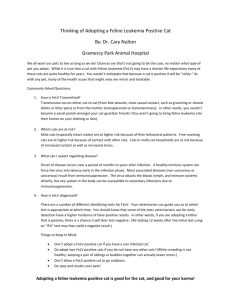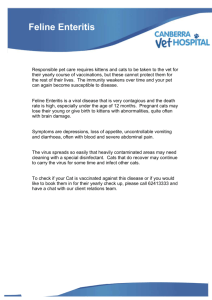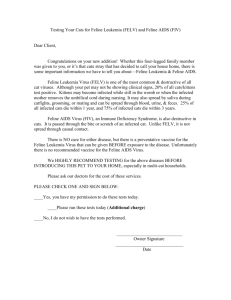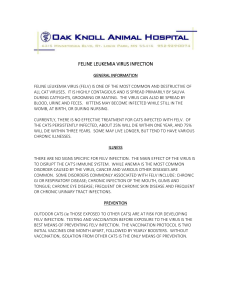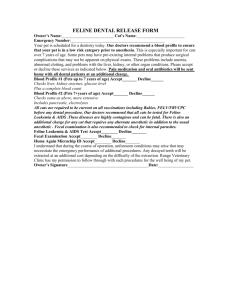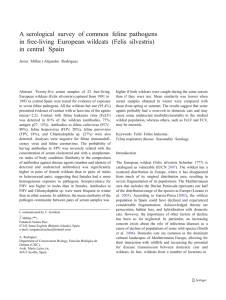Bird Populations
advertisement
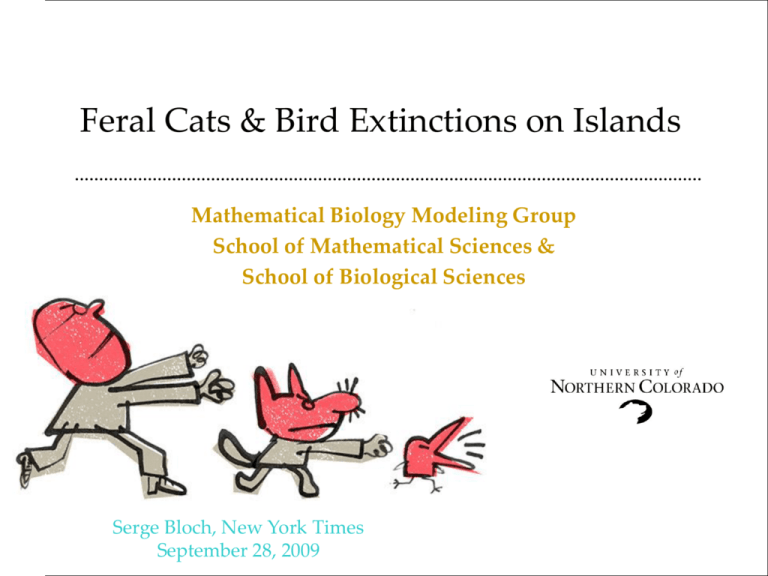
Feral Cats & Bird Extinctions on Islands Mathematical Biology Modeling Group School of Mathematical Sciences & School of Biological Sciences J. Fielder Serge Bloch, New York Times September 28, 2009 I am a poor mathematician…I remain mathematically semiliterate… ...I have succeeded to some extant in theoretical model building by collaborating with mathematical theoreticians…My role was to suggest problems to be addressed, to combine my intuition with theirs, and to lay out empirical evidence unknown to them. They were my intellectual prosthesis and I theirs. ~ E. O. Wilson ~ Naturalist, 1994, page 122 Jennie Summerall National Portrait Gallery, Washington, D. C. Oil on canvas M. Hayes Key Goals of Today’s Lab • Show how math can help explain ecological processes. • Demonstrate how biologists and mathematicians can collaborate to address problems that neither group could address on their own. Overview of Today’s Lab • Problem with feral cats on islands and a possible solution • What role can math play? – A gentle intro to mathematical modeling in ecology and its use in evaluating management strategies ~ Take a break ~ • Go to computer lab for a simulation of population dynamics on islands • Wrap up The Problem with Feral Cats on Islands • Kerguelen Islands (Chapuis 1995) – 5 domestic founder cats – How many cats will there be in 25 years? – Before you answer, let’s take a closer look at the island… glennmci.brinkster.net en.wikipedia.org http://www.chthonic.f9.co.uk/b3ta/underage.jpg Port-aux-Français Capital settlement of Kerguelen Island, French Territory • 60 winter inhabitants • 5 founder cats?... • up to 120 summer inhabitants • 25 years later…30,000 cats Birds killed per year? > 3 million per year! en.wikipedia.org/wiki/Port-aux-Français Control of Feral Cats • Culling & trapping are expensive • Time-consuming • Labor intensive • Controversial • Disease www.wildliferesearchmanagement.com.au NYTimes Diseases • Feline Immunodeficiency Virus =FIV • Feline Leukemia Virus =FeLV www.morgansplace.com Feline Leukemia Virus (FeLV) • Retrovirus • Found worldwide • Spread by coming in contact with saliva, urine, feces, and nasal secretions American Association of Feline Practitioners and Cornell Feline Health Center, 2006 FeLV Characteristics • Impossible to accurately predict the life expectancy of a cat with FeLV • Signs of the disease • • • • • • Loss of appetite, weight loss Poor coat condition Enlarged lymph nodes, may lead to cancer Persistent diarrhea and fever Inflammation of the gums Seizures, behavior changes, and neurological disorders • Primary stage • Concentrated in bloodstream • Some individuals become immune • Secondary stage • Later stage, infection in bone marrow and tissues • Point of no return • Leads to state of immune deficiency and cancer American Association of Feline Practitioners and Cornell Feline Health Center, 2006 Questions • What would you like to know before you introduce feline leukemia into the cat population on an island? http://www.petcareloop.com/images/twitter_question_mark.png?1255219975 Some of Our Questions • How deadly is the virus? How fast does it spread? • Does introducing the disease actually do what you want it to do? • How long will it take for the bird population to grow to recover? Modeling in Biology • A tool for understanding – Population growth or decline – Ecological systems and process – What variables in a system are important – Transmission of disease – Migration of a population – Habitat utilization Example: Modeling Northern Spotted Owl Population Data • • • • Lives in old-growth forests 1985-2003 19+ years of data 11,432 birds marked 32,054 capture events • This is complex data! • Cost > $30,000,000 • Analyzed data using a collaborative workshop of biologists, statisticians, & mathematicians. Types of Questions in Modeling Cat –Bird Populations 1. What information do we need to build a model? (what’s important? what’s not?) 2. What questions can the model answer? (what can the model predict?) 3. What questions can’t be answered by the model? Modeling Populations—2 Approaches Measuring Total population – Counts of animals, bacteria, trees, cells – Aided by sampling – Can be challenging/impossible to get accurate estimates Changes in population – Birth rates, death rates, infection rates, migration – Describe interaction between species Describing Rates Mathematically dB rB dt dB B rB 1 dt K • Seem complicated • Can be analyzed numerically and graphically • Easier to align with biological factors Exponential Growth Model Graph of Total Population Equation of Total Population N N 0e rt Equation of Population Change dN rN dt Logistic Growth Model Graph of Total Population Equation of Total Population N K K rt 1 1 e N0 Equation of Population Change dN N rN 1 dt K Cat-Bird Dynamics Tweety-Batman to the rescue! (along with differential equations) Predator-Prey with Logistic Growth Birds dB B rB B1 C dt K Cats dC C rC C 1 dt B/ Try an Example dB B rB B1 C dt K dC C rC C 1 dt B/ Starting Values Graph of (Cat, Bird) Trajectory Birds Cats What happens if a cat disease is introduced to the system? Birds dB B rB B1 C dt K Cats C dC ?? rC C 1 dt B/ The S-I-R Disease Equations dS / dt dI / dt dR / dt Describes how the number of susceptible, infected, and recovered individuals changes with time The State Diagram for FeLV A modified S-I-R model b b Immune Z 1- Susceptible X σ Viremic (very brief) Develop Symptoms Y m m Death • X+Y+Z = total population α m Differential equations for FeLV To the Computer Lab! Conclusion • What is modeling in biology, and how can it be used as a tool for understanding ecological systems? • Biological influences on a system that go into building a model – birth rate, death rate, disease, im/em-igration, food supply, etc. Wrapping it up • Yahoo article and worksheet www.flickr.com/photos/bostich/3048320868/
